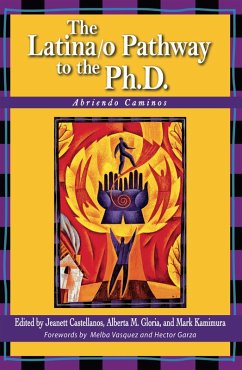The Latina/o population constitutes the largest racial and ethnic minority group in the U.S. and is disproportionately under-represented in college and in graduate programs. This is the first book specifically to engage with the absence of Latinas/os in doctoral studies. It proposes educational and administrative strategies to open up the pipeline, and institutional practices to ensure access, support, models and training for Latinas/os aspiring to the Ph.D. The under-education of Latina/o youth begins early. Given that by twelfth grade half will stop out or be pushed out of high school, and only seven percent will complete a college degree, it is not surprising so few enter graduate studies. When Latina/o students do enter higher education, few attend those colleges or universities that are gateways to graduate degrees. Regardless of the type of higher education institution they attend, Latinas/os often encounter social and academic isolation, unaffordable costs, and lack of support.This historic under-representation has created a vicious cycle of limited social and economic mobility. There is a paucity of the Latina/o faculty and leaders whom research shows are essential for changing campus climate and influencing institutions to adapt to the needs of a changing student body. As a result, Latina/o graduate students often have few role models, advocates or mentors, and limited support for their research agendas.By reviewing the pipeline from kindergarten through university, this book provides the needed data and insights to effect change for policy makers, administrators, faculty, and staff; and material for reflection for aspiring Latina/o Ph.D.s on the paths they have taken and the road ahead.The book then addresses the unique experiences and challenges faced by Latina/os in doctoral programs, and offers guidance for students and those responsible for them. Chapters cover issues of gender and generational differences, the role of culture in the graduate school, mentorship, pursuing research, and professional development opportunities for Latina/os.The book closes with the voices of by Latina/o students who are currently pursuing or recently completed their doctoral degree. These narratives describe their cultural and educational journeys, providing insight into their personal and professional experiences. These stories bring alive the graduate experience for anyone interested in successful recruitment, retention, and graduation of Latina/o doctoral students - an inspiration and guidance to those aspiring to the doctorate.
Dieser Download kann aus rechtlichen Gründen nur mit Rechnungsadresse in A, B, BG, CY, CZ, D, DK, EW, E, FIN, F, GR, HR, H, IRL, I, LT, L, LR, M, NL, PL, P, R, S, SLO, SK ausgeliefert werden.


